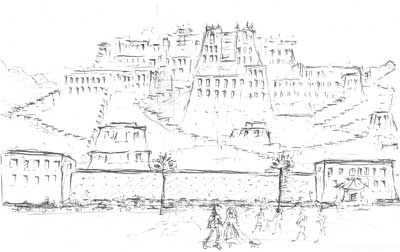| Forest Sangha Newsletter | October 2002 |
|
Reflections |
|
That was part of my inspiration; that there is this very rare opportunity in this age, that this situation exists. |
| I will take this opportunity to let you all know some of his plans. From the beginning of April, Luang Por will turn to a mode of seclusion. He will still remain at Amaravati but be more on his own. He'll also do some physical training to get himself ready for Mount Kailash. In May we'll take a flight to Thailand and then on to Kathmandu. Right now we are in the process of getting letters of recommendation to the Chinese Government to accompany our application forms so that we can go to Mount Kailash. At the beginning of June after we have finished the pilgrimage to Mount Kailash - I hope we will not be dumped at the Nepalese border - we have been invited to a Thai hotel, which has kutis for monks, and will stay there for a few weeks. Then we will fly back to Thailand and Luang Por will go on to Vientianne in Laos and then see his Upajjhaya. He will go to Vietnam. Some people who knew Luang Por when he was in the Peace Corps in Borneo have also invited him to go back to Borneo. Then Luang Por will return to Amaravati for the vassa. Straight after that he will go to India. So this is a good opportunity for Luang Por, after being involved for thirty-five years with setting up and running monasteries, to go back to places where he got inspiration about practice and Buddhism at the beginning of his practice. |
| Some people when they look back at their lives, at what they have been doing for twenty or thirty years, can feel regret because they can no longer use their bodies as they want, or they look in the mirror and they find an ugly face and grey hair. So, even though they have enormous wealth, they can not retrieve back anything. If we practice then, when we look back, we will never feel regret. As I look back at what happened for me over fifteen years, I never regret a single moment. Even though we can sit here with painful knees and backs, and feeling that we never get anywhere, never get enough samadhi, or that our minds are always restless, the process of training is just like that. But when you look back you will never regret. Do you believe me or not? |
 |
| This is my first time up on the High Seat. When I returned to Thailand to study Pali, Ajahn Jayasaro invited me to be the caretaker at Wat Pah Nanachat for two years running while the other monks went into the jungle at Kanchanaburi. When I had first gone to Nanachat I had met Ajahn Jayasaro in front of the sala where he was laying a path to it. I asked for the Abbot and he said, 'the Abbot has taken all the monks into the jungle at Kanchanaburi and now I am the caretaker of the place.' So seven or eight years later I found myself in the same position. When people would come and ask for the Abbot I'd say, 'he took the monks into the jungle at Kanchanaburi, I'm the caretaker here.' It was quite a surprise. Now I find myself on the Dhamma Seat. And I have a strong sense of when I first came here and heard Luang Por give a talk. It seemed to be the first time that I heard the word Katannu, gratitude. Luang Por uses this word almost every time he gives a talk about Luang Por Chah. So, I would like to express my Katannu Katavedi to Luang Por. Also to all the lay supporters. When I first came here I made friends here so that makes me feel that I belong to this place. Part of the reason that I decided to join the monastic life was because of the good support. I was surprised when I first came here - 'How did this place happen? Why can I just stay here without paying for board or anything else?' Then a week or two later I started to realize that when people came on Sundays they made big contributions, that they brought a lot of offerings with them. That was part of my inspiration; that there is this very rare opportunity in this age, that this situation exists. |